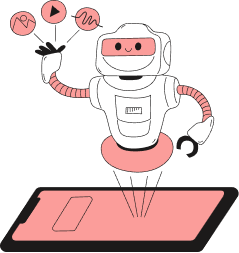- The Gradual Evolution of AI Agents
- The Core Value Proposition of AI Agents in Enterprise
- The Strategic Imperative: Why AI Agents Are Non-Negotiable Now
- The Market Reality
- Strategic Drivers
- Real-World Use Cases: Where AI Agents are Making a Measurable Impact
- Customer Service Automation
- Sales and Marketing Optimization
- Predictive Analytics and Data-Driven Decisions
- Operational Efficiency and Workflow Automation
- Key Strategic Considerations When Investing in AI Agents
- Choosing the Right Use Case
- Integration with Existing Systems
- Ensuring Scalability and Flexibility
- How Appinventiv Helped MyExec Build an AI Consultant for Data-Driven Intelligence and Drive Massive Gains
- Overcoming Common Pitfalls and Ensuring ROI
- Data Quality and Privacy Considerations
- Security, Compliance, and Certification: Building Trust in Enterprise AI
- Employee Adaptation and Buy-In
- Measuring the Impact and Long-Term ROI
- AI as the Backbone of Future Enterprises
- Preparing for Tomorrow's AI
- Why Choose Appinventiv for Your AI Agent Development Journey
- Conclusion
- FAQs
Key takeaways:
- AI agents go beyond automation by enabling real-time, data-driven decisions, optimizing processes, and identifying growth opportunities that were previously unseen.
- By leveraging AI agents, businesses can deliver hyper-personalized experiences across multiple channels, enhancing customer satisfaction and increasing retention.
- Companies using AI agents gain a competitive edge by automating routine tasks, improving workflows, and responding to market shifts faster than competitors.
- AI agents built on cloud-native, modular platforms offer flexibility and scalability, allowing businesses to evolve their AI capabilities as their needs grow.
- Unlike traditional systems, AI agents continuously optimize and adapt based on new data, improving both operational efficiency and strategic decision-making over time.
AI Agents in enterprises are delivering productivity leaps, not just through automation, but through intelligent orchestration of complex business workflows.
From autonomous procurement decisions that factor in geopolitical risk to customer interactions that anticipate needs ahead, AI agents are engineering business logic that adapts in real-time.
- Revenue per employee jumps.
- Time-to-resolution plummets.
- Customer acquisition costs optimize themselves.
The numbers tell the story: enterprises deploying AI agents report 55% faster decision cycles and a 66% increase in productivity (PwC). But here’s what the metrics don’t capture—these aren’t just efficiency plays. They’re competitive moats.
While competitors debate AI strategy in boardrooms, market leaders are already leveraging agents that learn, adapt, and scale across departments. The difference isn’t in the technology stack; it’s in the strategic application. Smart organizations aren’t asking “How do we use AI agents?” They’re asking, “Which business problems can intelligent enterprise agents solve better than humans, and how do we scale that advantage?”
The revolution with enterprise AI agents isn’t just coming. It’s here, delivering value and creating separation between leaders and laggards in ways that compound quarterly.
Looking for smarter ways to drive efficiency and customer satisfaction? Let’s work together to architect AI solutions that fit your business needs.
The Gradual Evolution of AI Agents
Understanding how AI agents work for enterprises starts with knowing how they differ from other systems. The growth of Large Language Models (LLMs) has pushed development of various AI systems, each with distinct abilities. From simple chatbots to sophisticated AI agents, these models have changed dramatically. Here’s how AI agents compare to other LLMs and their growing independence:
| AI System Type | Description | Independence Level | Where It’s Used |
|---|---|---|---|
| Chatbot | Simple conversation systems following set scripts to answer questions or help with basic tasks | Low: Works within tight limits with little flexibility | Customer support for common questions and simple interactions |
| Copilot | AI systems that help users by suggesting tasks, creating content, or giving recommendations based on what users input | Medium: Needs user input and offers suggestions, but still depends on user guidance | Workplace productivity tools, like writing emails or helping with project management |
| AI Assistant | More advanced systems that automate specific tasks, help with scheduling, provide relevant information, and adjust to user preferences | Medium to High: Gives smarter responses and suggestions based on past interactions | Personal assistants like Siri or Google Assistant, plus virtual HR helpers |
| AI Agent | Fully independent systems that make their own decisions, handle complex tasks, and adapt to real-time information without direct human supervision | High: Works independently, completing tasks and making decisions on its own | Applications like automated hiring, financial analysis, and customer service needing minimal human involvement |
The Core Value Proposition of AI Agents in Enterprise
Manual processes and reactive strategies are becoming competitive liabilities—AI agents are quietly transforming into the strategic backbone for enterprises ready to compete on intelligence, not just operational scale.
Behind the operational surface, neural networks and decision trees are powering everything from supply chain optimization to revenue forecasting—all while making enterprise functions more responsive, more contextual, and more strategically aware.
For organizations embedding artificial intelligence in enterprise performance management and core business processes, the transformation runs deeper than cost savings:
- Market responsiveness that turns disruption into opportunity
- AI agents in business decision-making
- Operational intelligence that never stops learning
For example, the enterprise sales cycle, where most companies still rely on quarterly forecasts. Market leaders are deploying enterprise AI agents that analyze prospect behavior, competitive positioning, and market timing simultaneously, surfacing opportunities that traditional CRM systems would miss entirely. The result isn’t just shorter sales cycles. It’s strategic positioning that creates market separation.
The enterprises winning today aren’t just integrating artificial intelligence in enterprise—they’re architecting smart AI agents for business as competitive infrastructure.
The Strategic Imperative: Why AI Agents Are Non-Negotiable Now
Customer expectations are outpacing operational budgets—AI agents are becoming the bridge between what customers demand and what enterprises can sustainably deliver.
While staffing costs, service inconsistencies, and limited availability windows are complex processes, developing an AI agent for enterprises can help handle volume without compromising quality. This shift isn’t about keeping up with trends—it’s about building operational advantages that compound over time.
The Market Reality
- Proven Maturity: AI agents for business have graduated from experimental tech to enterprise infrastructure with documented ROI across industries.
- Self-Optimizing Performance: Machine learning ensures agents improve continuously, getting smarter with each customer interaction without manual updates.
- Personalization at Scale: Transform customer data into tailored experiences that scale across thousands of touchpoints simultaneously.
- Cross-Industry Validation: Real implementations show measurable satisfaction gains across diverse business models.
[Also Read: 25 Disruptive AI Agent Business Ideas to Launch]
Strategic Drivers
- Cost Efficiency: Automate routine support tasks, freeing human resources for complex, high-value interactions.
- Always-On Operations: Deliver 24/7 availability without overnight staffing costs or operational complexity.
- Channel Consistency: Maintain service quality across chat, email, social media, and phone interactions seamlessly.
Real-World Use Cases: Where AI Agents are Making a Measurable Impact
The enterprises winning today aren’t debating artificial intelligence in enterprise performance management as an option—they’re optimizing AI deployment for maximum competitive advantage.
Here are the top examples of AI agents driving digital transformation in enterprises.
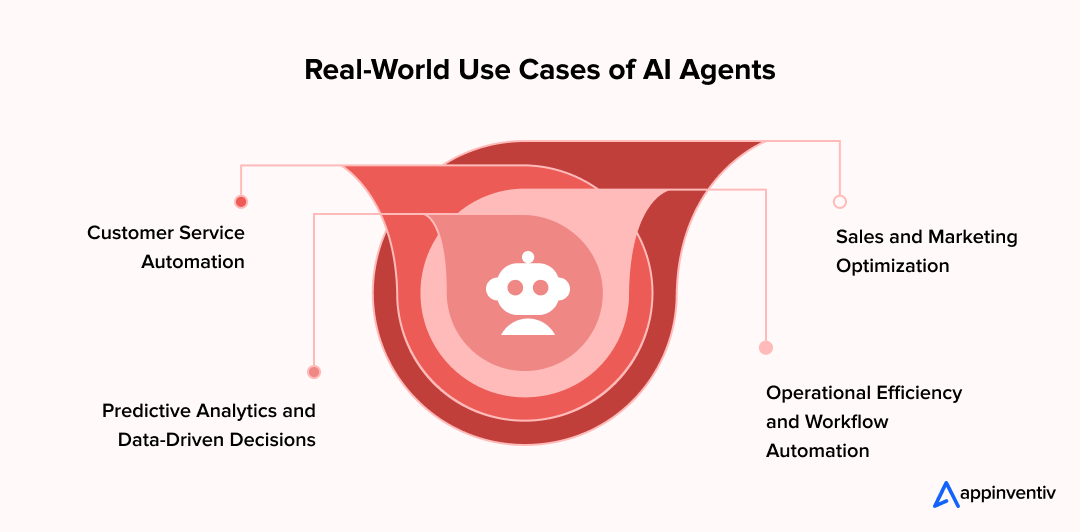
Customer Service Automation
From personalized interactions that remember your last conversations to instant problem-solving, enterprise AI agents for customer service are reshaping how businesses handle client relationships. Behind every seamless interaction, neural networks and conversation engines are powering everything from sentiment detection to interconnected workflows—all while making support more human and valuable.
How They’re Deployed
- AI-Driven Chatbots: Navigate complex queries with conversational intelligence that rivals human agents, maintaining context across multiple touchpoints.
- Virtual Assistants: Execute multi-step processes like account modifications, technical diagnostics, and purchase assistance while learning customer preferences.
- Smart Routing Systems: Analyze intent, history, and complexity to connect customers with the optimal resource—human or AI—for first-contact resolution.
Industry Applications of Custom AI Agent in Enterprises
- Enterprise Software: Diagnose system issues, surface relevant documentation, and escalate with full technical context mapped.
- Financial Services: Process routine banking while flagging compliance-sensitive requests, maintaining security without sacrificing speed.
- E-commerce: Identify at-risk orders, recommend alternatives for inventory gaps, and prioritize high-value customer issues.
Sales and Marketing Optimization
Cookie-cutter campaigns are dead—custom AI agents in enterprises are becoming the growth engine for brands ready to turn customer data into competitive currency.
From hyper-personalized email sequences that adapt to individual behavior patterns to campaign targeting that shifts in real-time based on engagement signals, AI agents aren’t just managing marketing—they’re orchestrating revenue generation that learns and optimizes continuously. Behind every conversion, machine learning algorithms are analyzing purchase intent, behavioral triggers, and lifecycle positioning to deliver messaging that resonates at the moment of maximum impact of AI agent in enterprises.
How They Drive Growth
- CRM Integration: Segment customers based on predictive lifetime value, surfacing cross-sell opportunities and churn risks before they become problems.
- Dynamic Content Optimization: Automatically adjust messaging, offers, and product recommendations based on real-time behavioral analysis.
- Campaign Orchestration: Coordinate multi-channel touchpoints with personalized timing and messaging that maximizes engagement probability.
Predictive Analytics and Data-Driven Decisions
AI agents enhance demand forecasting by considering seasonal trends, economic indicators, and competitive movements, while also conducting risk assessments to prevent operational blind spots. AI agents in business decision-making aren’t just crunching numbers—they’re generating strategic intelligence. Advanced analytics engines process everything from supply chain volatility to customer behavior shifts, delivering insights that traditional business intelligence tools would miss entirely.
Strategic Industry Applications
- Supply Chain Intelligence: Predict demand fluctuations, optimize inventory levels, and automatically adjust procurement schedules based on market signals.
- Financial Forecasting: Analyze revenue patterns, cash flow trends, and market conditions to inform budget allocation and investment timing.
- Risk Management: Identify operational vulnerabilities, compliance gaps, and market threats before they impact business performance. Beyond customer service and marketing, enterprises are deploying autonomous data engineering through agentic AI to handle complex data transformation tasks and maintain data quality at scale.
- While enterprise AI agents deliver productivity gains across industries, insurance-specific AI agents must address unique challenges including regulatory compliance, risk assessment accuracy, and seamless integration with legacy policy administration systems.
Operational Efficiency and Workflow Automation
From automated report generation that synthesizes data across multiple systems to inventory tracking that maintains accuracy without human intervention, AI agents for operational efficiency aren’t just handling tasks—they’re orchestrating entire workflows that adapt to changing business conditions. Process automation engines integrate with existing ERP and CRM systems, eliminating data silos while reducing the human error that compounds into costly operational failures.
Strategic Industry Applications
- ERP System Integration: Automate financial reporting, procurement workflows, and compliance documentation while maintaining audit trails.
- Inventory Management: Track stock levels, predict reorder points, and coordinate with suppliers to maintain optimal inventory balance.
- Process Optimization: Identify workflow bottlenecks, suggest efficiency improvements, and automatically implement approved optimizations.
Key Strategic Considerations When Investing in AI Agents
The strategic advantage goes to enterprises that architect AI agent deployments for adaptability, ensuring their investment grows more valuable as their business evolves.
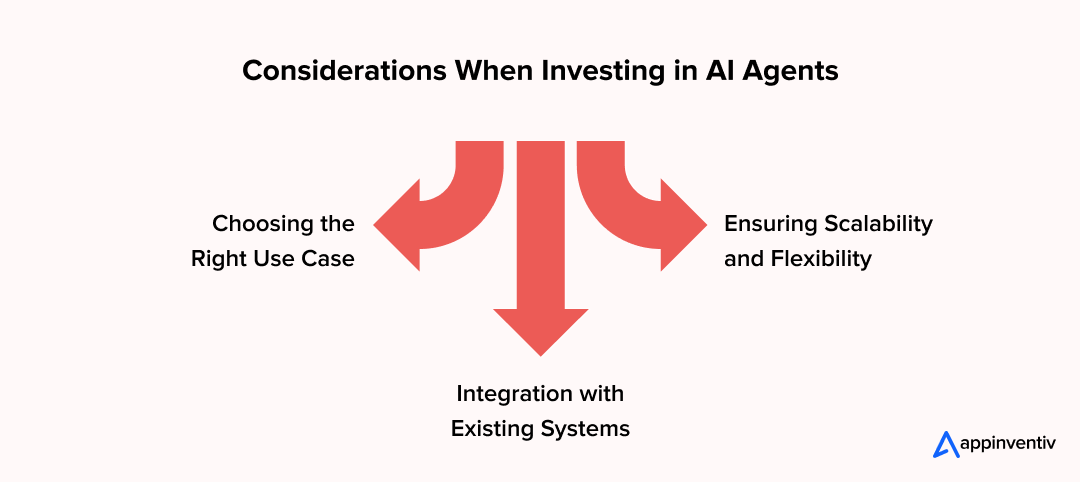
Choosing the Right Use Case
Strategic deployment of artificial intelligence in enterprise performance management or complete transformation isn’t about adopting everything at once—it’s about driving innovation with AI agents and delivering maximum business impact.
Smart enterprises start with high-frequency, high-impact processes where AI agents can demonstrate clear value quickly, then expand into more complex applications. The key is balancing immediate ROI with long-term competitive positioning—choosing initial deployments that solve pressing business problems while creating infrastructure for future capabilities.
Strategic Assessment Framework
- Quick Win Identification: Target repetitive, rule-based processes with clear success metrics like customer inquiry resolution or order processing.
- Value Chain Analysis: Map where enterprise AI agents for customer service can eliminate bottlenecks in service delivery, sales qualification, or supply chain coordination.
- Competitive Advantage Mapping: Prioritize use cases and benefits of AI agents in enterprise that creates sustainable differentiation.
The winners identify use cases where AI agents don’t just automate existing processes—they enable entirely new business capabilities.
Integration with Existing Systems
The technology space is filled with powerful tools that couldn’t play nicely with existing infrastructure—AI agents succeed when they enhance current workflows rather than requiring complete system overhauls.
Seamless integration means AI agents become invisible extensions of existing operations, accessing CRM data, updating ERP systems, and coordinating with sales platforms without creating new training requirements or operational friction. Modern AI platforms leverage APIs and pre-built connectors to integrate with AI agents in enterprise applications, ensuring agents augment human capabilities rather than replacing familiar tools.
Integration Essentials
- API-First Architecture: Ensure AI agents can communicate bidirectionally with CRM, ERP, and specialized business applications.
- Workflow Preservation: Design implementations that enhance existing processes rather than forcing teams to learn entirely new systems.
- Data Synchronization: Maintain real-time data consistency across all platforms so AI agents work with current, accurate information.
The enterprises succeeding with AI agents treat integration as a strategic capability, not a technical afterthought.
Ensuring Scalability and Flexibility
Today’s AI investment must adapt to tomorrow’s business reality—rigid systems become expensive mistakes when market conditions shift or business requirements evolve.
Cloud-native AI platforms provide the infrastructure flexibility that growing enterprises demand, scaling computational resources based on usage. This approach eliminates the traditional trade-off between capability and cost, driving innovation with AI agents while maintaining performance standards.
Scalability Architecture
- Cloud-Based Deployment: Leverage elastic computing resources that scale with business growth without requiring additional hardware investments.
- Modular Design: Build custom AI agents in enterprises that can be expanded, modified, or reconfigured as business needs evolve.
- Future-Proof Integration: Choose platforms that support emerging AI capabilities and can incorporate new technologies without complete reimplementation.
Also Read: How Much Does It Cost to Build an AI Agent?
How Appinventiv Helped MyExec Build an AI Consultant for Data-Driven Intelligence and Drive Massive Gains
Appinventiv worked with MyExec to build an AI business consultant that helps small and medium businesses make smarter decisions using data. Using advanced multi-agent RAG systems, the AI examines business documents and delivers practical, strategic advice. This platform lets SMBs make quick, informed choices without paying expensive consultant fees.
Key Results:
- Instant Strategic Advice: AI reviews documents and gives immediate, relevant recommendations for each business situation.
- Affordable Expert Help: SMBs get high-quality consultancy at a tiny fraction of what traditional experts charge.
- Smoother Operations: Automated document review and practical insights let business owners focus on growth and planning.
- Growing AI Platform: The system expands with businesses, constantly improving and adding new data sources.
- Faster Decisions: AI recommendations speed up choices, helping businesses react to market shifts quickly and accurately.
This AI solution shows how AI agents create real value by improving decision-making and helping businesses scale while staying efficient.
Don’t let your competitors get ahead. Implement scalable AI agents that optimize your operations, enhance customer experiences, and drive smarter decision-making.
Overcoming Common Pitfalls and Ensuring ROI
AI agent deployments can transform operations or become expensive experiments—the difference lies in implementation that prioritizes business outcomes. Smart enterprises navigate common pitfalls by treating AI adoption as competitive infrastructure, not just operational upgrade.
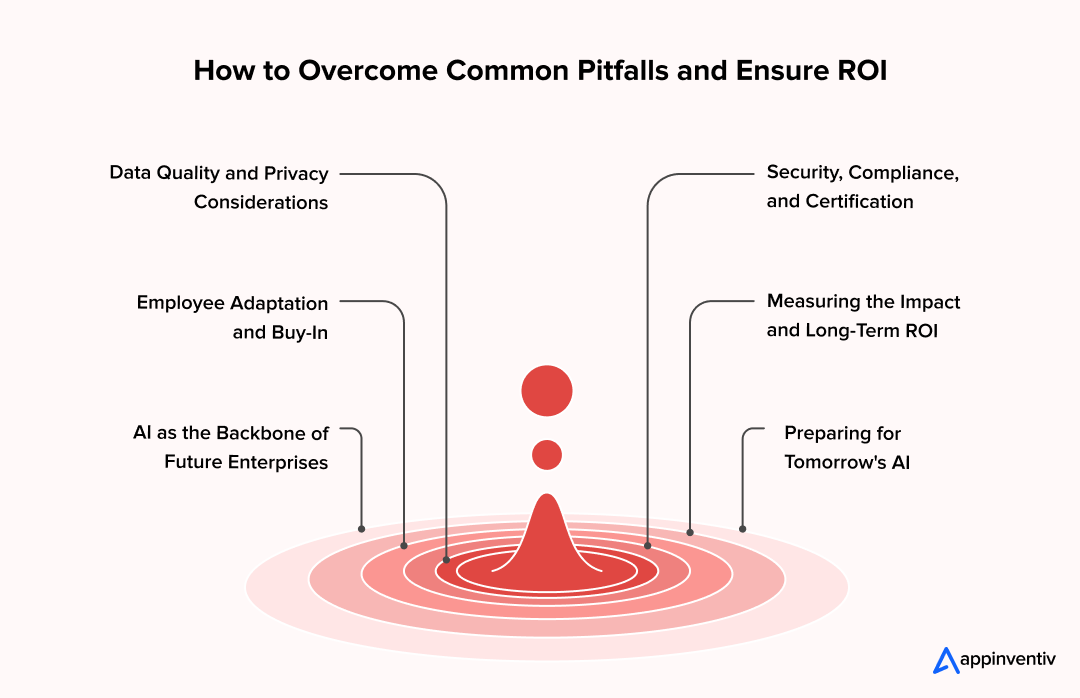
Data Quality and Privacy Considerations
Clean data is the foundation of intelligent AI performance—agents are only as smart as the information they process, making data quality a strategic imperative rather than a technical detail.
Structured, accurate data enables AI agents in business decision-making to deliver consistent results. Meanwhile, robust data security frameworks ensure compliance with GDPR, CCPA, and industry-specific regulations while maintaining the trust that enterprise AI deployments require. Smart organizations treat data governance as competitive infrastructure, building systems that protect privacy while enabling enterprise AI agents to access the information they need for optimal performance.
Data Excellence Framework
- Quality Assurance: Implement automated data validation and cleansing processes that maintain accuracy across all AI agent touchpoints.
- Privacy by Design: Build compliance protocols directly into AI systems, ensuring regulatory adherence without compromising functionality.
- Security Infrastructure: Deploy encryption, access controls, and audit trails that protect sensitive information while enabling AI agent operations.
Security, Compliance, and Certification: Building Trust in Enterprise AI
Enterprise AI agents require more than fancy features – they need bulletproof protection for sensitive information plus strict regulatory compliance. Security matters most when handling customer, financial, or health records.
What to Check:
- Industry Certifications: Find platforms with SOC2, HIPAA, and GDPR badges to safeguard your information.
- Data Protection Deals: Verify your vendor has solid agreements with third-party AI suppliers.
- Access Limits: Demand tight authentication and authorization blocking unauthorized users.
- Activity Records: Track all AI agent actions for compliance reviews and oversight.
Getting these basics right shields your company and earns customer trust, setting up sustainable AI growth.
Employee Adaptation and Buy-In
AI agents for enterprises succeed when they amplify human capabilities rather than competing with them—the most effective implementations position AI agents in digital transformation of enterprises to enhance productivity.
Strategic deployment focuses on augmentation over automation, enabling employees to focus on high-value activities while AI agents handle routine tasks. This approach transforms AI adoption from a workforce concern into a productivity opportunity, creating buy-in through demonstrated value rather than forced compliance. Training programs that help teams understand how to collaborate with AI agents accelerate adoption and maximize return on investment.
Human-AI Collaboration Strategy
- Empowerment Focus: Position AI agents as tools that enhance employee capabilities rather than replacements for human judgment.
- Skills Development: Provide training that helps teams understand how to direct, collaborate with, and optimize AI agent performance.
- Value Demonstration: Start with use cases that clearly improve daily work experiences, building enthusiasm for broader AI adoption.
Measuring the Impact and Long-Term ROI
Strategic AI investment requires precise measurement—defining the right KPIs that deliver measurable business value rather than just technological sophistication.
Effective measurement frameworks track tangible outcomes like cost reduction, productivity gains, and customer satisfaction while establishing baselines that demonstrate the impact of AI agents in enterprises over time.
ROI Measurement Framework
- Business-Focused KPIs: Track metrics that directly impact financial performance: customer acquisition costs, resolution times, revenue per employee, and operational efficiency gains.
- Baseline Establishment: Document pre-AI performance levels to accurately measure improvement and calculate return on investment.
- Continuous Optimization: Monitor AI agent performance regularly, adjusting strategies based on real-world results and evolving business needs.
Looking Ahead: The Future of AI Agents in the Enterprise
The next evolution of AI agents in enterprise moves beyond executing commands to anticipating needs. Transforming from digital assistants into strategic advisors, AI agents are poised to shape business direction in real-time.
AI as the Backbone of Future Enterprises
Tomorrow’s AI agents for enterprise automation will mount entire business ecosystems, making autonomous decisions about resource allocation, market positioning, and operational optimization. At the same time, they will learn from outcomes to improve future performance.
These systems will process market signals, competitive intelligence, and internal performance data simultaneously, delivering strategic recommendations that human teams can act on immediately or delegate entirely to AI execution.
The Autonomous Enterprise
- Predictive Strategy: AI agents will forecast market shifts and automatically adjust pricing, inventory, and marketing spend before competitive pressures emerge.
- Ecosystem Orchestration: Intelligent systems will coordinate supplier relationships, customer engagement, and internal operations as interconnected strategic functions.
- Real-Time Adaptation: Business processes will continuously optimize based on performance data, market conditions, and customer behavior without requiring human intervention.
This isn’t distant future thinking—early adopters are already deploying AI-powered agents for business growth that optimize staffing levels as well as adjust campaign targeting.
Preparing for Tomorrow’s AI
Future-ready enterprises are building AI strategies that adapt to technological advancements rather than requiring complete rebuilds with each innovation wave.
Future-Proof Strategy
- Adaptive Infrastructure: Build AI systems that can incorporate new models, capabilities, and technologies without disrupting existing operations.
- Continuous Learning Culture: Develop teams that understand AI possibilities and limitations, enabling faster adoption of breakthrough capabilities.
- Strategic Partnerships: Align with services that prioritize driving innovation with AI agents, ensuring long-term investment protection.
The strategic advantage to building the best AI agents in enterprise requires continuous evolution, choosing platforms that embrace emerging capabilities while maintaining operational stability. For enterprises to dominate the next decade it is essential to build capabilities that accelerate with technological progress.
Why Choose Appinventiv for Your AI Agent Development Journey
Appinventiv delivers strategic AI agent development services that fits seamlessly into your current operations, scaling from small tests to company-wide automation. We mix deep technical know-how with business strategy, making sure AI agents tackle real problems instead of just showing off cool features.
With over 10 years of expertise in AI product engineering, we solve actual business challenges using smart, scalable AI agents. Our approach combines advanced technology with strategic business insights, helping companies deliver personalized experiences and streamline complex workflows.
Our AI development services have transformed how businesses operate – from conversational AI that personalizes budgeting to enterprise systems that improve financial workflows with dynamic, AI-driven interactions. We help businesses redefine customer engagement while meeting the highest security and performance standards that enterprise operations require.
Our relentless commitment to innovation and excellence in AI development was recently recognized with the AI Excellence Award as we’ve been named a Leader in AI Product Engineering & Digital Transformation by the Economic Times.
AI-Powered Success Stories
We’ve delivered impactful AI solutions across industries:
- Vyrb – Social Media App: We developed an AI-powered platform for Vyrb that personalized content discovery and enabled voice-based interactions. The result? Higher user engagement and improved retention.
- Mudra – Budget Management App: For Mudra, we created an AI-driven finance app that offers real-time budget tracking and personalized insights. Through predictive analytics, Mudra helps users make smarter financial decisions.
- Flynas – Airline App: We built an AI-powered app for Flynas that delivers personalized flight recommendations and optimizes travel routes. The app enhances the passenger experience, making travel more efficient and tailored.
- JobGet – Job Search App: JobGet is an AI-driven job search app we developed to match candidates with the most relevant opportunities. It uses machine learning to enhance recruitment efficiency and improve the candidate experience.
We architect AI agents as a competitive infrastructure that continuously adds value. Our full-service approach, from consulting and deployment to ongoing optimization, ensures AI solutions evolve with your business needs, positioning you as an AI-driven market leader.
Ready to architect your AI agent strategy? Let’s partner to build enterprise agents that drive sustainable competitive advantage
Conclusion
The most successful AI transformations in enterprises start with choosing a suitable use case that solves immediate business problems while creating infrastructure for automation.
But tactical wins are just the foundation. Market leadership requires architectural thinking—building AI capabilities that compound over time, learn, and optimize continuously. This means treating AI agents not as expense reduction tools, but as strategic investments that fundamentally change how your enterprise competes.
The opportunity window is narrowing. Early adopters get to establish AI-powered advantages in CX, operational efficiency, and strategic agility. On the other hand, late movers face the challenge of competing against organizations that have already transformed their core business processes with intelligent automation.
Therefore, the enterprises defining the next decade won’t be those with the most sophisticated AI strategies—they’ll be the ones that moved first and learned fastest through intelligent action.
Book your AI strategy session with our experts now.
FAQs
Q. What is one benefit of using AI in the enterprise value chain?
A. Predictive intelligence is one of the valuable benefits of AI agents in enterprise. It sees around corners, transforming enterprise value chains by anticipating market shifts, demand fluctuations, and operational bottlenecks before the detail performance.
The result?
- Resource allocation that stays ahead of the curve
- Waste reduction that compounds savings
- Competitive positioning of AI agents in digital transformation of enterprises, turning market uncertainty into a strategic advantage
Q. How has AI had an impact on the enterprise?
A. The enterprise landscape has been fundamentally altered—competition shifted to building AI agents for operational efficiency. Organizations deploying AI don’t just work faster, they work smarter. Decision cycles accelerate. Customer satisfaction climbs. Costs optimize themselves.
Q. How do AI agents optimize business processes in enterprises?
A. Pattern recognition meets process perfection—enterprise AI agents perform various tasks to optimize business processes, such as:
- Analyzing workflow inefficiencies
- Automatically adjusting operations based on real-time performance data
- Spotting bottlenecks before they cascade
The lucrative outcomes it generates include the elimination of manual errors and ensuring seamless cross-departmental coordination. Every interaction teaches the system to optimize further. The edge lies in continuous improvement, which never stops learning.
Q. What are the key benefits of using AI agents in businesses?
A. Three strategic advantages that compound over time:
- Operational intelligence that scales without adding headcount proportionally
- Personalized experiences delivered at enterprise scale without manual intervention
- Predictive capabilities that turn market volatility into a competitive opportunity
The real value? Benefits that get stronger as agents learn, creating competitive separation that widens quarterly.
Q. What role do AI agents play in business automation and efficiency?
A. Beyond task automation—AI agents for businesses coordinate intelligent task execution that adapts to changing conditions in real-time. They handle workflows, make contextual decisions, and maintain operational consistency that manual processes can’t match at scale. This isn’t about replacing humans. It’s about amplifying business intelligence to compete on capability, not just capacity.


- In just 2 mins you will get a response
- Your idea is 100% protected by our Non Disclosure Agreement.

How AI Chatbots for eCommerce are Driving 3x More Sales in 2026
Key takeaways: AI chatbots for eCommerce have a direct impact on revenue. When aligned with buying intent, they lift conversions, increase order value, and drive repeat purchases. The strongest impact comes from personalization and guided selling, helping shoppers decide faster and buy with greater confidence. Abandoned cart recovery is a major revenue driver in 2026.…

AI-Powered Booking Optimization for Beauty Salons in Dubai: Costs, ROI & App Development
Key Highlights AI booking optimization improves utilization, reduces no-shows, and stabilizes predictable salon revenue streams. Enterprise salon platforms enable centralized scheduling, customer insights, and scalable multi-location operational control. AI-enabled booking platforms can be designed to align with UAE data protection regulations and secure payment standards. Predictive scheduling and personalization increase customer retention while significantly reducing…
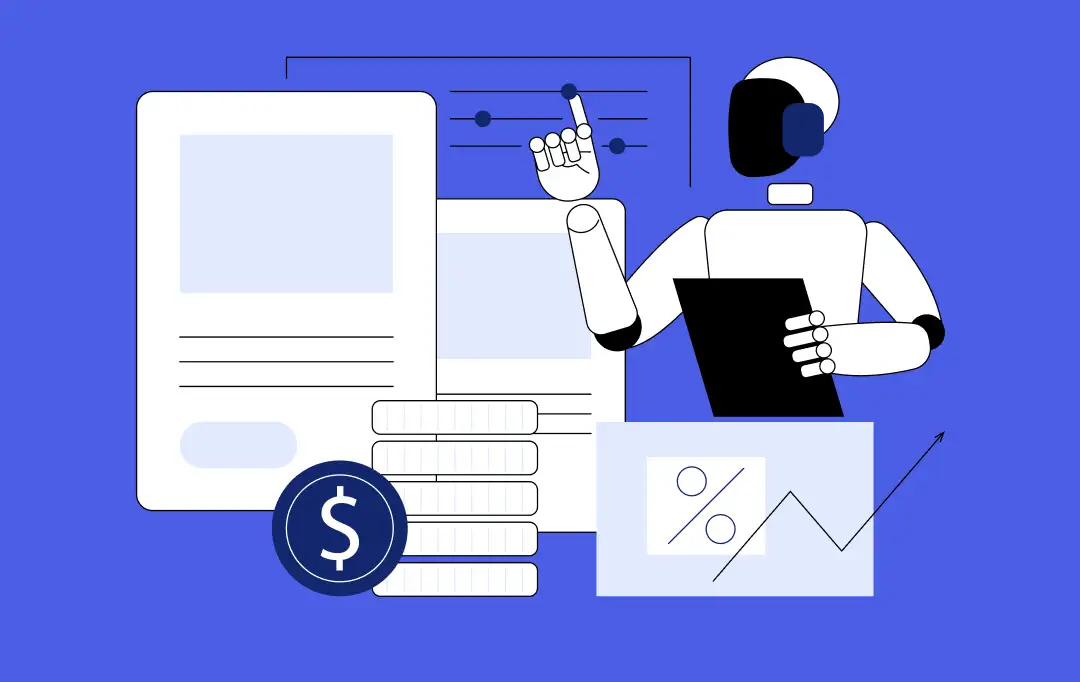
Data Mesh vs Data Fabric: Which Architecture Actually Scales With Business Growth?
Key takeaways: Data Mesh supports decentralized scaling, while Data Fabric improves integration efficiency across growing business environments. Hybrid architectures often deliver flexibility, governance, and scalability without forcing premature enterprise-level complexity decisions. Early architecture choices directly influence reporting accuracy, experimentation speed, and future AI readiness across teams. Phased adoption reduces risk, controls costs, and allows architecture…



























